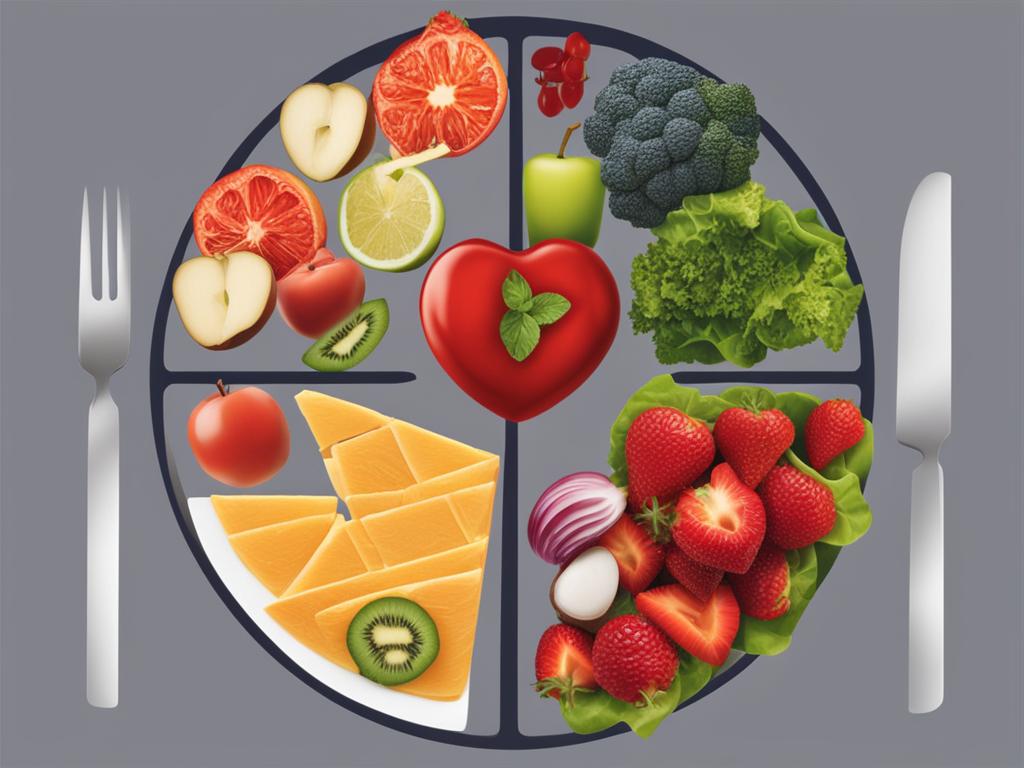Diet definition : A healthy diet is essential for good health and nutrition. It plays a vital role in protecting against chronic noncommunicable diseases such as heart disease, diabetes, and cancer. But what exactly is a diet?
A diet refers to the food and drinks that a person consumes regularly. It includes the patterns of eating and the types of foods chosen. Understanding the meaning of diet is crucial for making informed choices about what we eat and how it affects our health.
A healthy diet consists of a variety of foods that provide essential nutrients, including carbohydrates, proteins, fats, vitamins, and minerals. It emphasizes the consumption of whole grains, fruits, vegetables, lean proteins, and healthy fats, while limiting the intake of salt, sugars, and unhealthy fats.
Key Takeaways:
- A diet refers to the food and drinks that a person consumes regularly.
- A healthy diet is crucial for good health and nutrition.
- A healthy diet includes a variety of foods and limits salt, sugars, and unhealthy fats.
Components of a Healthy Diet
A healthy diet consists of a variety of nutrient-rich foods that provide essential vitamins, minerals, dietary fiber, plant protein, and antioxidants. By incorporating these components into your daily meals, you can promote optimal health and well-being.
Here are the key components of a healthy diet:
- Staple Foods: Include cereals and starchy vegetables in your diet to provide a good source of energy.
- Legumes: Incorporate legumes such as beans, lentils, and chickpeas for their high protein content and dietary fiber which helps in digestion.
- Fruits and Vegetables: Consume a variety of fruits and vegetables to obtain essential vitamins, minerals, antioxidants, and dietary fiber. Eating a diverse range of colorful fruits and vegetables reduces the risk of obesity, heart disease, stroke, diabetes, and certain types of cancer.
- Foods from Animal Sources: Include lean meats, fish, eggs, and dairy products to provide high-quality protein and important nutrients like vitamin B12.
It’s important to note that a healthy diet should also consider the quality of fats and sugars consumed. Consuming healthier fats from vegetable oils is recommended, while consuming excessive amounts of sugar should be limited to less than 10% of your total energy intake. By making these dietary choices, you can optimize your health and well-being.
A healthy diet is the foundation for good health. By consuming a variety of nutrient-dense foods, you provide your body with the necessary fuel it needs to function at its best. Remember, a healthy diet is not about deprivation; it’s about making informed and balanced choices that nourish your body and support your overall well-being.
Importance of a Healthy Diet
Following a healthy diet is crucial for maintaining overall health and well-being. It provides the necessary nutrients for optimal body function and supports a balanced lifestyle. A healthy diet helps in maintaining a healthy weight, reducing the risk of chronic diseases, improving energy levels, and promoting proper growth and development. It is important to consume a variety of foods to ensure adequate intake of essential nutrients.
Eating a balanced diet that includes a mix of fruits, vegetables, whole grains, lean proteins, and healthy fats is essential for maintaining good health. These foods provide a wide range of vitamins, minerals, fiber, and other important nutrients that the body needs to function properly. A balanced diet also helps in weight management by providing the body with the right amount of energy without excess calories that can lead to weight gain.
In addition to maintaining a healthy weight, a nutritious diet plays a vital role in reducing the risk of chronic diseases such as heart disease, type 2 diabetes, and certain types of cancer. Nutrient-rich foods, such as fruits, vegetables, whole grains, and lean proteins, are known to have protective effects against these diseases. They contain antioxidants, vitamins, and minerals that help strengthen the immune system, fight inflammation, and promote overall health.
“A healthy diet is the foundation of a healthy life.”
Proper growth and development are also dependent on a healthy diet. Nutrients like calcium, iron, protein, and vitamins are crucial for bone health, brain development, and overall physical growth. Children and teenagers, in particular, require a well-balanced diet to support their rapid growth and development.
Ensuring a diverse and varied diet is essential for obtaining all the required nutrients the body needs. Each food group provides different essential nutrients, so it is important to include a wide range of fruits, vegetables, whole grains, lean proteins, and healthy fats in your daily meals. This will help ensure you are receiving all the necessary vitamins, minerals, and other nutrients required for good health.
Remember, a healthy diet is not about strict rules or deprivation, but about making informed and conscious choices that prioritize your health and wellness.
Essential Nutrients Found in Different Food Groups
| Food Group | Essential Nutrients |
|---|---|
| Fruits and Vegetables | Vitamins A, C, and K, fiber, antioxidants |
| Whole Grains | Fiber, B vitamins, iron, magnesium |
| Lean Proteins | Protein, iron, zinc, B vitamins |
| Dairy or Dairy Alternatives | Calcium, vitamin D |
| Healthy Fats | Omega-3 fatty acids, monounsaturated fats |

Consuming a variety of foods from each food group is the key to a well-rounded and nutrient-rich diet. By prioritizing a healthy diet, you can significantly improve your overall health and well-being.
Types of Diets
When it comes to selecting a diet, there are various options available that cater to different health goals and personal preferences. These diets have specific guidelines and focus on particular food selections. Here are some common types of diets:
- Mediterranean Diet: This diet is inspired by the traditional eating habits of people living in Mediterranean countries. It emphasizes whole grains, fruits, vegetables, legumes, lean proteins like fish and poultry, healthy fats such as olive oil, and moderate consumption of red wine. The Mediterranean diet has been associated with numerous health benefits, including heart health and longevity.
- DASH Diet: The Dietary Approaches to Stop Hypertension (DASH) diet is primarily designed to lower blood pressure. It emphasizes fruits, vegetables, low-fat dairy products, whole grains, lean proteins, and limits high-sodium foods. The DASH diet is also known to support overall heart health.
- Vegetarian/Vegan Diet: Vegetarian and vegan diets remove or significantly limit the consumption of animal products. Vegetarian diets include plant-based foods like fruits, vegetables, whole grains, legumes, nuts, and dairy products, while vegan diets exclude all animal-derived ingredients. These diets are often followed for ethical, environmental, or health reasons.
Each type of diet has its own unique approach to food selection, portion sizes, and restrictions. Some people may follow specific diets for weight loss purposes, while others may choose a particular diet to manage health conditions such as diabetes or food allergies.
Here’s an image that visually represents the different types of diets:

Comparison of Different Diets
| Diet | Focus | Food Selection | Benefits |
|---|---|---|---|
| Mediterranean Diet | Heart health | Whole grains, fruits, vegetables, lean proteins, healthy fats | Reduced risk of heart disease, longevity |
| DASH Diet | Blood pressure control | Low-sodium, fruits, vegetables, lean proteins, whole grains | Lower blood pressure, improved heart health |
| Vegetarian/Vegan Diet | Ethics, health | Plant-based foods, dairy products (vegetarian), no animal products (vegan) | Reduced risk of chronic diseases, environmental sustainability |
It’s important to consult with a healthcare professional or registered dietitian before making any significant changes to your diet to ensure that it aligns with your individual health needs and goals.
Role of Diet in Disease Prevention
A healthy diet plays a significant role in preventing and managing various diseases. By making nutritious food choices and maintaining a balanced diet, individuals can take control of their health and reduce the risk of developing certain disorders.
Evidence suggests that following a healthy diet can have the following benefits:
- Control Blood Pressure: A diet rich in fruits, vegetables, whole grains, and low-fat dairy products, known as the Dietary Approaches to Stop Hypertension (DASH) diet, has been shown to help lower blood pressure levels. By optimizing blood pressure, individuals can lower their risk of heart disease and stroke.
- Reduce Risk of Heart Disease: Consuming a heart-healthy diet that is low in saturated and trans fats, cholesterol, and sodium can significantly reduce the risk of developing heart disease. Including lean proteins, whole grains, and healthy fats from sources like nuts and olive oil can improve heart health.
- Improve Insulin Sensitivity in Diabetes: Individuals with diabetes can benefit from a diet that helps maintain stable blood sugar levels and improves insulin sensitivity. Focus on consuming nutrient-dense foods, such as whole grains, lean proteins, fruits, vegetables, and healthy fats.
- Support Healthy Growth and Development: A well-balanced diet provides essential nutrients that support proper growth and development in children and adolescents. Nutrients like calcium, iron, and vitamins play a crucial role in bone health, cognitive function, and overall well-being.
- Boost the Immune System: Adequate nutrition is vital for a robust immune system. Eating a variety of nutrient-rich foods that contain vitamins A, C, E, zinc, and selenium can help strengthen the immune response and reduce the risk of infections.
- Reduce Risk of Nutrient Deficiencies: Following a balanced diet ensures the intake of all essential nutrients, reducing the risk of deficiencies that can lead to various health problems. For example, consuming sufficient iron prevents iron-deficiency anemia, while incorporating sources of vitamin C enhances iron absorption.
By understanding the role of diet in disease prevention, individuals can make informed choices about their dietary habits and take steps towards improving their overall health.

Recommended Dietary Guidelines
Various organizations, such as the World Health Organization (WHO) and U.S. dietary guidelines, provide recommendations for a balanced diet. These guidelines emphasize the consumption of a variety of foods to ensure an adequate intake of essential nutrients like vitamins, minerals, proteins, and carbohydrates. They also encourage limiting the consumption of unhealthy fats, sugars, and excessive sodium. Following these guidelines can help individuals maintain good health and prevent chronic diseases.
Essential Nutrients and Their Importance
A balanced diet consists of a combination of different nutrients that play a crucial role in supporting overall health. Here are some essential nutrients and their importance:
| Nutrient | Role |
|---|---|
| Protein | Needed for growth, repair, and maintenance of body tissues. Acts as a building block for muscles, enzymes, and hormones. |
| Carbohydrates | Provide energy for the body, particularly the brain and muscles. Include sources like grains, fruits, and vegetables. |
| Fats | Essential for energy, insulation, and protection of organs. Choose healthy fats from sources like olive oil, avocados, and nuts. |
| Vitamins | Support various bodily functions, including metabolism, immune function, and cell production. Found in fruits, vegetables, and fortified foods. |
| Minerals | Play a role in maintaining proper body function and development. Examples include calcium for strong bones and iron for oxygen transportation in the blood. |
Consuming a variety of foods from different food groups ensures a balanced intake of these essential nutrients. This can be achieved by following the recommended dietary guidelines provided by reputable organizations.
“A balanced diet is crucial for maintaining good health and preventing chronic diseases. By focusing on consuming a wide variety of nutrients, individuals can optimize their overall well-being.”
Limiting the consumption of unhealthy fats, sugars, and excessive sodium is equally important. Excessive intake of these can lead to weight gain, increased risk of chronic diseases, and nutrient deficiencies. By following the dietary guidelines, individuals can maintain a healthy weight and reduce the risk of developing conditions such as heart disease, diabetes, and certain types of cancer.
It is essential to highlight that the recommended dietary guidelines provide general recommendations for the overall population. Individual nutritional needs may vary based on factors such as age, gender, activity level, and underlying health conditions. Consulting with a healthcare professional or registered dietitian can help determine personalized dietary recommendations tailored to specific needs.
Adopting a balanced diet and following the recommended dietary guidelines is an important step towards improving and maintaining good health throughout life.

Benefits of Specific Nutrients
Different nutrients play vital roles in supporting overall health. Carbohydrates, fats, proteins, vitamins, and minerals are essential for various body functions and provide numerous health benefits.
Carbohydrates
Carbohydrates are the body’s main source of energy. They are found in foods like bread, rice, pasta, and fruits. Carbohydrates are an important fuel for the brain, muscles, and other organs. They provide energy for physical activity, aid in digestion, and support proper brain function.
Fats
Fats are an essential part of a healthy diet. They provide energy, cushion organs, and help the body absorb fat-soluble vitamins. Monounsaturated and polyunsaturated fats, found in avocados, nuts, and fish, are considered healthy fats that support heart health. However, trans fats and saturated fats, found in processed foods and animal products, should be limited for optimal health.
Proteins
Proteins are necessary for growth, repair, and maintenance of body tissues. They are made up of amino acids, which are the building blocks of life. Proteins can be found in sources such as meat, poultry, fish, dairy products, legumes, and nuts. Protein-rich diets help in building and repairing muscles, supporting a healthy immune system, and promoting overall growth and development.
Vitamins and Minerals
Vitamins and minerals are micronutrients that are crucial for various bodily functions. They help in maintaining healthy bones, teeth, and skin, supporting a strong immune system, and promoting proper cell function. Each vitamin and mineral has its own specific benefits:
- Vitamin C: Supports the immune system and helps in the production of collagen, a protein necessary for wound healing.
- Calcium: Promotes bone health and is necessary for muscle function and nerve transmission.
- Iron: Aids in the production of red blood cells and prevents iron deficiency anemia.
Consuming a balanced diet that includes a variety of foods from different food groups ensures an adequate intake of essential vitamins, minerals, and other nutrients necessary for optimal health.

Impact of Diets on Chronic Diseases
Research has shown that diet plays a significant role in the prevention and management of chronic diseases. A healthy diet can help reduce the risk of developing type 2 diabetes, heart disease, and certain types of cancer. This emphasizes the importance of making informed dietary choices to maintain optimal health and well-being.
Specific diets like the Mediterranean diet and DASH diet have been associated with a lower risk of these chronic diseases. These diets focus on consuming nutrient-rich foods and maintaining a balanced intake of essential nutrients.
A healthy diet can also support weight loss and help individuals maintain a healthy body weight. Excess weight is a risk factor for chronic diseases such as diabetes and heart disease, so controlling weight through diet is crucial for overall health.
The impact of diet on specific chronic diseases:
| Chronic Disease | Dietary Impact |
|---|---|
| Type 2 Diabetes | A healthy diet can help control blood sugar levels and prevent the development of type 2 diabetes. Emphasizing whole foods, fiber-rich carbohydrates, and lean proteins is important for managing diabetes. |
| Heart Disease | A diet low in saturated and trans fats, cholesterol, and sodium can help reduce the risk of heart disease. Emphasizing fruits, vegetables, whole grains, and lean proteins, while limiting processed and high-fat foods, is key. |
| Certain Types of Cancer | Some studies suggest that a diet rich in fruits, vegetables, whole grains, and lean proteins may reduce the risk of certain types of cancer. Antioxidant-rich foods, like berries and dark leafy greens, may have protective effects. |
Adhering to a balanced and nutritious diet is essential for preventing and managing chronic diseases. By making healthy food choices and following dietary recommendations, individuals can improve their overall health and well-being and reduce the risk of developing these debilitating ailments.

Conclusion
A healthy diet is essential for maintaining good health, preventing chronic diseases, and promoting overall well-being. By consuming a variety of nutritious foods, limiting unhealthy fats and sugars, and maintaining a balanced intake of essential nutrients, individuals can optimize their health and lead a sustainable and healthy lifestyle.
Following dietary guidelines, such as the Mediterranean diet or DASH diet, can provide numerous health benefits. These guidelines emphasize the consumption of whole grains, fruits, vegetables, lean proteins, and healthy fats, while limiting processed foods, sugary beverages, and excessive sodium.
By making healthy food choices and adopting a balanced diet, individuals can fuel their bodies with the necessary nutrients to support optimal physical and mental function. A balanced diet not only supports weight management and disease prevention but also boosts energy levels, promotes proper growth and development, and strengthens the immune system.
Incorporating a balanced diet into one’s lifestyle is a long-term commitment to prioritize health and wellness. By understanding the importance of nutrition and making conscious choices, individuals can take control of their well-being and enjoy the benefits of a healthy diet for years to come.
Also Read : Scarsdale Diet Guide: Lose Weight Effectively
FAQ
Q: What is the definition of diet?
A: The diet is the sum of food and drink consumed by a person. It can also refer to the intentional selection of certain foods to control weight or improve health.
Q: Can you provide an example of a diet?
A: An example of a diet could be a plan that includes consuming balanced meals consisting of fruits, vegetables, lean proteins, and whole grains, while limiting the intake of processed and high-calorie foods.
Q: Where can I find the diet definition in a dictionary?
A: You can find the diet definition in an English dictionary, such as the Oxford English Dictionary or Merriam-Webster.
Q: How is the word “diet” related to health?
A: The word “diet” is often associated with health as it pertains to the consumption of food and drink, and the impact it has on the overall well-being of an individual.
Q: Do religious practices have a specific usage of the word “diet”?
A: Yes, religious practices may have specific dietary restrictions or prescribed food and drink consumption, which are often referred to as religious diets.
Q: Can the word “diet” have different meanings in medical contexts?
A: Yes, the word “diet” may have different meanings in medical contexts, such as being used to describe prescribed food and drink consumption for the treatment of certain health conditions.
Q: Is the word “diet” commonly used in the English language?
A: Yes, the word “diet” is commonly used in the English language, especially in relation to discussions about nutrition, weight management, and overall health.
Q: How is the word “diet” used in a sentence?
A: The word “diet” can be used in a sentence like, “A balanced diet and regular exercise are important for maintaining a healthy lifestyle.”
Q: What does the term “diet definition” typically refer to?
A: The term “diet definition” typically refers to explanations or definitions of the word “diet” as it pertains to food, nutrition, and health.
Q: How can I express my opinion on a specific diet?
A: You can express your opinion on a specific diet by discussing its benefits, drawbacks, and any personal experiences related to following or experimenting with that particular diet.








Leave A Comment